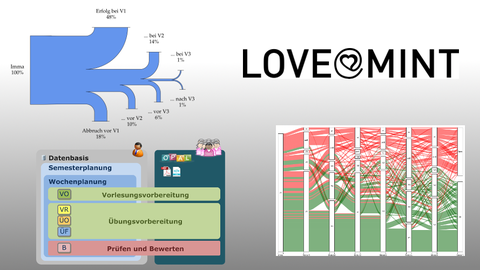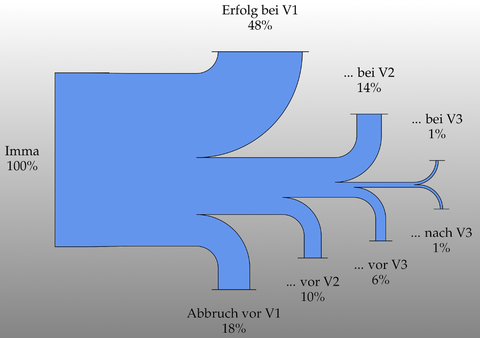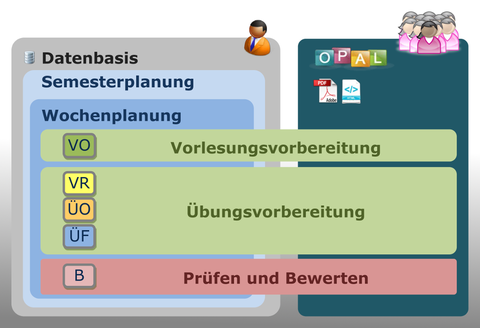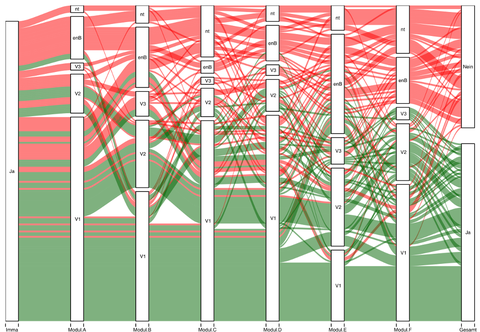Forschungsfeld "Fachdidaktik der Ingenieurwissenschaften"
Innerhalb der ingenieurwissenschaftlichen Ausbildung spielen Grundlagenfächer eine Schlüsselrolle zur Sicherung des Studienerfolges. Die Untersuchungen der vielfältigen Einflussfaktoren am Beispiel der Mechanikausbildung gelten vor allem der Qualitätssicherung der institutionellen Rahmenbedingungen und der Stärkung der Selbstreflexion sowie der verifizierten Förderung Lernender in der Studieneingangsphase. Von besonderem Interesse ist hierbei das interdisziplinäre Zusammenspiel zwischen Ingenieurwissenschaft, Ingenieurdidaktik und psychologischer Diagnostik. Bisher wurden die Bemühungen in diesem Forschungsfeld mit zwei Lehrpreisen der Gesellschaft der Freunde und Förderer der TU Dresden sowie dem Sächsischen Lehrpreis des Staatsministeriums für Wissenschaft und Kunst ausgezeichnet.
Forschungsprojekte
Projekt wird gefördert durch den ESF (Europäischen Sozialfond)
Kooperation mit:
Prof. Dr. Daniel Leising (Technische Universität Dresden)
Abstrakt:
Es wird für die erfahrungsgemäß sehr anspruchsvollen Grundlagenmodule des MINT-Bereichs ein additionales Angebot geschaffen: die Identifikation potentieller Studienabbrecher/innen anhand von Umfragen in der Studieneingangsphase und eine passend zugeschnittene Förderung. Der Studienerfolg wird dadurch sehr frühzeitig in drei Dimensionen gesteigert:
- Studierende mit einer geringen Abbruchswahrscheinlichkeit werden in ihrer Lernmotivation gestärkt
-
Studierende mit einer mittleren Abbruchswahrscheinlichkeit werden durch zusätzliche Beratungsangebote gefördert
-
Studierende mit einer großen Abbruchswahrscheinlichkeit werden „wachgerüttelt“ und ggf. über alternative Studienangebote informiert.
Insgesamt profitieren von diesem Angebot alle Studierenden im Grundstudium durch die verbesserte Selbsteinschätzung der eigenen Leistungsfähigkeit.
Referenzen:
Vogel, S.: Predicting study progress in a complete cohort of civil engineering students, Diplomarbeit. Institut für Klinische, Diagnostische und Differentielle Psychologie sowie Institut für Mechanik und Flächentragwerke, Technische Universität Dresden, Dresden, 2016
Abstrakt:
EMSIG steht für die elektronische Unterstützung des Lehrens und Lernens in der Ingenieurwissenschaft und es beinhaltet die umfassende Verknüpfung von Lehrorganisation und Lehrdurchführung zur nachhaltigen Verbesserung des Lernprozesses. Die entwickelte und erfolgreich eingesetzte Software konzentriert sich sowohl auf Aspekte des E‑Learnings als auch des E‑Teachings. Kern des Systems ist dabei einerseits die rechnergestützte Erstellung von Vorlesungsvorlagen sowie darauf abgestimmten Übungsunterlagen und andererseits die Erzeugung von personalisierten Online-Testaufgaben mit anschließender automatisierter Auswertung.
Referenzen:
Franze, A.: EMSIG – E-Learning Management System in der ingenieurwissenschaftlichen Grundlagenausbildung. In: HDS Journal (2015), S. 39–45
ausgezeichnet mit dem Sächsischen Lehrpreis 2014
Abstrakt:
Die richtige Visualisierung von Prüfungsergebnissen hilft einerseits Studierenden bei der Selbsteinschätzung ihrer Leistung und andererseits Prüfenden bei der Beurteilung ihrer Prüfung. Im Projekt werden Möglichkeiten der Prüfungsauswertung untersucht. Dies betrifft sowohl die Auswertung der Trennschärfe und Schwierigkeit von einzelnen Prüfungsteilen als auch die Beurteilung des gesamten Prüfungsergebnisses. Einen besonderen Schwerpunkt bilden hierbei die semesterübergreifende Analyse von Prüfungsresultaten und die Untersuchung von „Prüfungslebensläufen“ Studierender (siehe Abbildung).
Die visuelle Auswertung der Ergebnisse einer Prüfung kann vom Kleinen zum Großen strukturiert und in diesem Sinne auf Aufgaben, Prüfungen, Jahrgänge, Kohorten sowie Studiengänge bezogen werden. Dabei unterscheidet sich die Nützlichkeit und Interpretation der jeweiligen Darstellung in Abhängigkeit vom adressierten Personenkreis erheblich.
Referenzen:
Franze, A.: Mehr als ein Kuchendiagramm - Möglichkeiten der Prüfungsauswertung. In: HDS Journal (2016), im Druck
zum Forschungsfeld "Schädigungs- und Bruchmechanik"
zum Forschungsfeld "Multiphysikalische Materialmodellierung auf mehreren Skalen"





